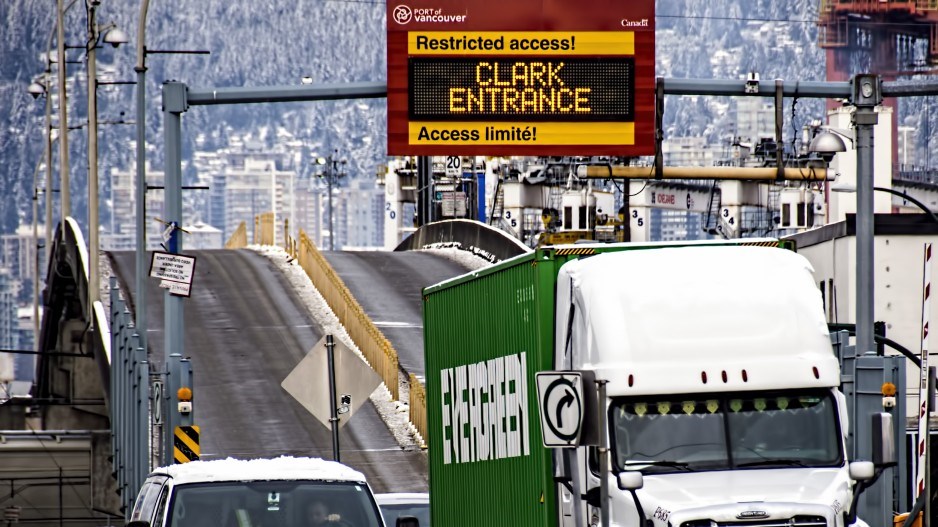It started with toilet paper and ended with gasoline. In the early days of the COVID-19 pandemic, in the spring of 2020, people hoarded toilet paper, fearful that it would become scarce, due to global supply chain interruptions.
There was a temporary shortage of bicycles, bicycle tires and parts, and a multitude of other consumer goods. Even now, you may have a long wait to take delivery of that new electric car you ordered because there was a shortage of automotive computer chips.
More recently, due to flooding in November, B.C. motorists were subjected to gasoline rationing.
Environmental activist blockades, wildfires, floods, extreme cold, a global pandemic – the supply chain link that is transportation has taken hit after hit in B.C. over the past couple of years.
While it has demonstrated some surprising resilience, events of the past two years underline how important and vulnerable it can be.
“It’s remarkable that we rebuilt our trade infrastructure in the span of two months,” Greg D’Avignon, president of the Business Council of BC, said of the recent interruptions from flooding during a session on transportation and supply chains at the final day of the BC Natural Resources Forum.
“We were back up and running again and didn’t miss a beat. And we’ll forget about the supply chain stuff in another few months.”
There could be more supply chain issues coming, however, this time in the form of a shortage of truckers. New vaccine mandates for truckers who move goods between Canada and the U.S., are expected to go into effect, and could result in unvaccinated truckers not being allowed to enter or exit the country.
Before a global pandemic shut down industries and caused major supply chain interruptions, resulting in shortages of a range of goods, few British Columbians probably gave much thought to how the things they buy daily gets to them.
And until they were subjected to gasoline rationing, they may not have given much thought to where their gasoline comes from.
“Can you remember a time when how we get products from point A to point B was such a hot topic around the dinner table, on Twitter feeds and on the nightly news?” Alexa Young, moderator of the Thursday session, asked.
“Have you, your friends, your family, ever been forced to think so much about what you use each day, at home and in your workplaces and what happens when you can’t access those thing?”
Transportation is particularly important to B.C.’s natural resource industries, since so much of what they produce moves by truck, rail and ship. Recent events over the last two years have underscored the need to maintain and improve transportation and supply chain resilience.
“Has the pandemic really fundamentally shifted or changed the future of the supply chain? I think it really has,” said James Thompson, vice president, Western Canada, for Canadian National Railway (TSX:CNR)
“I think what it has done is it's challenged the supply chain and supply chain players to be nimbler, to come together more often, to be more connected and more understanding of each other challenges and trials.”
Going forward, extreme weather events from climate change means transportation and supply chains will likely face more periodic, potentially catastrophic, damage and interruptions.
Ian Anderson, vice president of logistics for Teck Resources (TSX:TECK.B), cited a 2020 McKinsey and Co. report that warned that extreme weather events from climate change “is the weakest link in global supply chains."
“And of course we really did see those impacts in British Columbia this past year,” Anderson said.
That’s a big concern for companies like Teck, which relies on railways and both of B.C.’s ports to move export commodities like metallurgical coal and copper, and pipelines like Trans Mountain to move the oil it produces in Alberta at the Fort Hills oil sands mine.
Fortunately, for Teck and other B.C. producers, the Port of Prince Rupert provided an alternative to the Port of Vancouver during recent flooding events that cut rail and highway links to the Lower Mainland, and is currently undergoing a major expansion to its capacity.
“We're continuing to expand our bulk export capabilities, especially in the liquid bulk and alternative energy space,” said Ken Veldman, vice president of public affairs for the Prince Rupert Port Authority.
“We have about $2.5 billion of investment either under construction or very close to it, and we’re developing it all in an integrated manner that really eliminates additional costs, bottlenecks and land conflicts.”
As for the very fuel that transportation relies on – from trucks and locomotives to ships and airplanes – a single pipeline supplies B.C. with most of its oil and refined fuels. The $12.6 billion pipeline twinning project that underway may provide some redundancy, said Michael Davies, chief operating office for Trans Mountain Corp.
“One of the things, as we look forward -- and it's often overlooked -- our expansion project is known to many as a market access project, and it very much is. But another important aspect of it that, I think, the floods have brought to the fore is the resiliency of infrastructure.
“So it will provide us with a second pipeline -- in a similar corridor, but a second pipeline that will help provide supply resilience going forward.”




